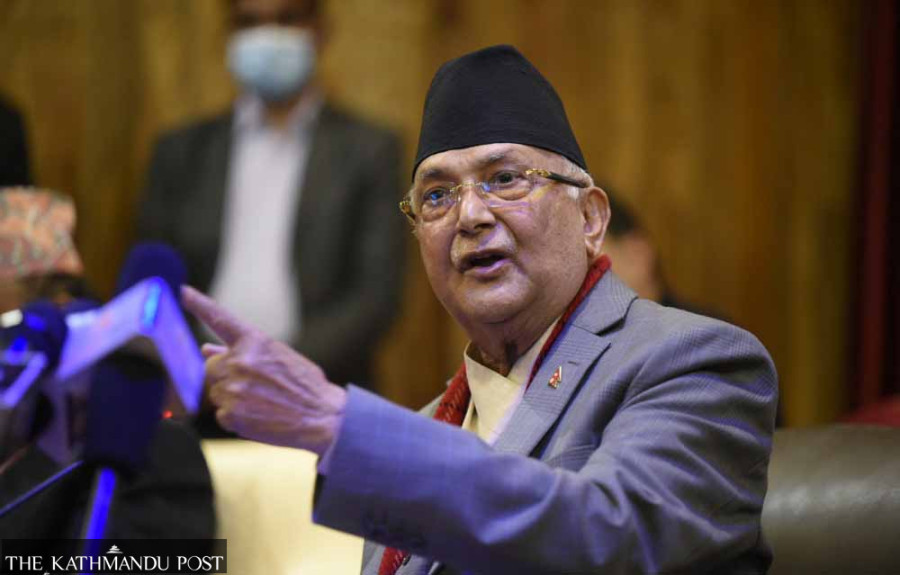Politics
Oli gets opportunity to fix his chequered history
Amid government failures, there is not much excitement in the public but Oli has no luxury to fail, analysts say.
Binod Ghimire
As CPN-UML chairperson KP Sharma Oli becomes the country’s prime minister for the fourth time, he also carries a chequered history from his previous terms as the country’s chief executive.
When he first took the seat at Singha Durbar in October 2015, wresting it from Sushil Koirala, violent protests were rife in the Tarai/Madhesh region in the wake of the promulgation of the Constitution of Nepal. The situation had been more difficult due to India’s blockade.
A few months into Oli’s tenure, the southern neighbour withdrew its blockade while the constitution was amended to address the concerns of the agitating communities. Though the Madhesh-based parties boycotted voting on the constitution amendment, it had partially addressed the concerns of the dissenting groups.
His government also signed a historic Trade and Transit Agreement with China, ending Nepal’s sole dependence on India for third-country trade.
Oli’s nationalist graph as prime minister for 10 months between October 2015 to August 2016 went up so high that his CPN-UML not only emerged the largest party from the 2017 election but was very close to the majority mark on its own. When Oli moved into Baluwatar for the second time in February 2018, he had an even stronger electoral mandate. After a merger with the CPN (Maoist Centre) two months later, the Nepal Communist Party that he jointly led with Pushpa Kamal Dahal enjoyed a near two-thirds majority in the House of Representatives.
Oli’s prime ministership started with high hopes and excitement as he was leading a majority government for the first time in around two decades. As Oli was set to lead the government for a full five-year term, the hope was that decades of political instability would end, the constitution would be implemented and the federal system strengthened.
The expectations, however, were short-lived. Oli started demonstrating his authoritarian streak right after taking charge as the executive head. He brought the National Intelligence Department, the Department of Revenue Investigation and the Department of Money Laundering under the purview of the Prime Minister’s Office.
His intolerance for dissent became apparent when he banned protests at Maitighar, near Singha Durbar, the government’s seat. His government then prepared a slew of bills aiming to muzzle the media, curtail freedom of expression and shrink civic space.
He had contested the elections by selling big dreams—railway connecting China, Nepal’s own ship in the high seas, and distribution of gas through pipelines, among other things. But none of these dreams even came close to fruition. Having realised he had failed to deliver as promised even two years after coming to power, he played another nationalist card—amending the constitution to show Kalapani, Lipulekh and Limpiyadhura in Nepal’s map—which his predecessors never dared to do. While it has been registered as a historic move in the country, it antagonised New Delhi.
Oli’s unilateral style of running government and leading the party forced Pushpa Kamal Dahal and Madhav Kumar Nepal to ally against him, leading to a split in the Nepal Communist Party. After failing to keep the NCP united, Oli tried to dissolve the House—twice in under six months.
His decision to trample on the constitution to stay in led to his humiliating exit from the government. He was ousted by the Supreme Court.
Political analysts say Oli has a historic opportunity to right the previous wrongs. “The Congress-UML alliance has generated high hopes and provides an opportunity for Oli to correct his past mistakes,” Uddhab Pyakurel, who teaches political sociology at Kathmandu University, told the Post. “However, Oli’s recent statements [on House dissolution] show he is still not in the mood for course correction. He has no regrets about his wrongdoings.”
Oli has repeatedly defended his move to dissolve the House even until last month.
The Congress-UML alliance stands on the foundation for stability. But how can the person who couldn’t give stability even when he commanded a majority government ensure stable government now, says Pyakurel. “Trust in the new government will be low as the parties have kept secret even the agreement that led to its formation,” he says.
However, some analysts say it would not be easy for the incumbent not to deliver. “There is a strong voice within both the Congress and the UML that it is futile to form a government that cannot deliver. So the pressure to perform will come from both the ruling alliance as well as the opposition,” says Sanjeev Humagain, who teaches PhD students in politics and international relations at Tribhuvan University.
“The Congress-UML coalition has the political capital needed to deliver. The bureaucracy too will find it difficult not to cooperate with the government of two major forces. I see a positive environment for delivery.”




 11.12°C Kathmandu
11.12°C Kathmandu















